#ERP Software for Manufacturing Industry
Explore tagged Tumblr posts
Text
How Manufacturers Can Manage Growth with ERP
Introduction:
In the dynamic landscape of manufacturing, where growth is the ultimate goal, the ability to adapt and streamline operations is paramount. Enter ERP (Enterprise Resource Planning), a powerful solution that has revolutionized the way manufacturers operate. In this blog, we'll explore the significant role of ERP software for manufacturing industry and how it serves as a catalyst for sustainable growth. Whether you're in traditional manufacturing or a software development company, ERP solutions are key to optimizing processes and managing growth effectively.
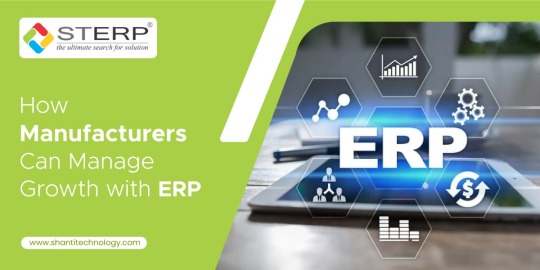
Understanding the Essence of ERP Software for Manufacturing:
1. Efficiency Unleashed:
ERP system for manufacturing industry is designed to enhance operational efficiency by integrating various business processes. From order management and procurement to production planning and inventory control, ERP systems bring together disparate functions into a unified platform, eliminating silos and enhancing overall efficiency.
2. Real-time Insights:
One of the key advantages of ERP solutions is the ability to provide real-time insights into business operations. Manufacturers can make informed decisions based on up-to-date information, helping them respond swiftly to market changes, manage resources effectively, and capitalize on growth opportunities.
3. Scalability Matters:
As a manufacturer, scalability is a constant consideration. Whether you're a growing traditional manufacturing unit or a software development company expanding its operations, ERP systems offer scalability to accommodate changing needs. The modular nature of ERP solutions allows businesses to add or modify functionalities as they evolve.
4. Improved Collaboration:
Collaboration is the bedrock of successful manufacturing. ERP fosters better communication and collaboration by providing a centralized platform where employees across different departments can access and share information seamlessly. This not only enhances teamwork but also accelerates decision-making processes.
ERP Software for Manufacturing Industry: Tailoring Solutions for Success
1. Production Planning and Scheduling:
In the manufacturing realm, effective production planning and scheduling are crucial for meeting customer demands and maintaining optimal inventory levels. ERP systems facilitate streamlined production processes, enabling manufacturers to create realistic production schedules, allocate resources efficiently, and minimize downtime.
2. Supply Chain Management:
A well-integrated supply chain is essential for manufacturers. ERP solution for the manufacturing industry ensures smooth coordination between suppliers, manufacturers, and distributors. This results in better inventory management, reduced lead times, and ultimately, improved customer satisfaction.
3. Quality Control:
Maintaining consistent product quality is non-negotiable in manufacturing. ERP solutions provide tools for comprehensive quality control by enabling real-time monitoring of production processes, tracking defects, and ensuring adherence to quality standards. This not only boosts customer confidence but also reduces wastage and rework costs.
4. Financial Management:
The financial aspect is the backbone of any business. ERP systems for manufacturing offer robust financial management capabilities, including invoicing, expense tracking, and financial reporting. This level of financial control is invaluable for manufacturers looking to manage growth effectively and make strategic financial decisions.
ERP for Software Development Company: Tailoring Solutions to Tech
1. Project Management:
For software development companies, managing projects efficiently is critical. ERP solutions designed for the software development industry offer project management modules that help track project timelines, allocate resources effectively, and ensure that development projects stay on course.
2. Resource Planning:
In the software development realm, talent is a primary resource. ERP systems tailored for software companies facilitate resource planning by providing insights into employee availability, skills, and project commitments. This ensures optimal resource allocation for project success.
3. Version Control and Collaboration:
Version control and collaboration are key aspects of software development. ERP solutions for software companies include features that enable version control, code collaboration, and documentation management. This ensures that development teams work cohesively, leading to efficient project outcomes.
4. Compliance and Security:
In the software development industry, compliance and security are paramount. ERP systems for software companies often include modules that help manage compliance with industry standards and ensure data security. This is especially crucial in an era where data protection is a top priority.
Conclusion:
As manufacturers navigate the complexities of growth, ERP software emerges as an indispensable tool for success. Whether you're in traditional manufacturing or a software development company, the benefits of ERP systems are far-reaching. From enhancing operational efficiency and providing real-time insights to tailoring solutions for specific industry needs, ERP is the key to managing growth effectively. Embrace the power of ERP, and propel your manufacturing operations into a future of streamlined processes, informed decision-making, and sustained success.
#Go-To-Market#GTM#Supply-Chain-Management#Technology#India#ERP-India#ERP#Business-Solutions#Manufacturer#Engineering#Inventory-Management#ERP Software for Manufacturing Industry#ERP System for Manufacturing Industry#ERP for Software Development Company#ERP Solutions for Manufacturing
7 notes
·
View notes
Text
#Top 5 ERP for Small Business in 2025 | ERP for Manufacturing Industry
#Top 5 ERP for Small Business in 2025

1. SAP Business One: SAP Business One is designed for small and medium enterprises and the software addresses complex business processes with tools for finance, inventory management and customer relationship management. This piece of software fits well with scaling businesses because of its integration options.
2. Odoo ERP: With a modular structure and free of charge, customers could get an all-wear blueshift matched for production, accounting, human resource, and sales. Due to integration, it is fortunate in meeting the needs of the growing business.
3. 2iSolutions: A cloud based ERP for business globalization and with business intelligence and analytics for updated reporting. When it comes to an ERP system, 2iSolutions has a focus on delivering customized ERP solutions.
4. TallyPrime: Popular in India, it is a simple, GST-compatible software that provides small business with homemade accounting and inventory systems within the local legal framework.
5. Microsoft Dynamics 365: Having connections with both AI and IoT, Dynamics 365 enriches manufacturing processes and forecasting for performance.
Each of these ERP systems offers unique strengths, enabling businesses to align their choice with specific operational requirements and industry nuances.
ERP for Small Business and Manufacturing Industries
Today, in the context of a constantly progressing business world, rapid and flexible work is crucial. Enterprise Resource Planning (ERP) has emerged as a core strategic application for small business and manufacturing companies due to centralization of many operations. This paper shows how dominant processes are linked and how real-time information in ERP systems enables organizations to remain competitive and deal with changing market requirements.
On the same notion, this paper argues that small businesses defined in the manufacturing industries face constraints which include the following; These challenges can be handled effectively through ERP solutions because those systems offer a holistic solution for improving business processes and efficiency of resource use and meeting statutory requirements.
Including inventory tracking, production scheduling and cost accounting, ERP for Small Business allows organizations to cut waste and improve their performance dramatically. In the world today, organizations said that real-time data usage helps them to identify various opportunities, develop the ability to foresee or anticipate the future and make the appropriate changes thus enhancing their operations sustainability.
Enterprise resource planning systems bring about changes to the operation of an organization by eliminating unnecessary duplicate processes and enhancing organizational integration of departments. This integrated concept not only fulfills the organization productivity but it can also encourage the establishments to grow in a planned way with the help of maximum efficiency without any negotiation on the quality as well as on the strategies for customer satisfaction.
Proposing use of ERP technology has become the need of every business that wants to establish itself successfully especially in the global arena which makes every market a competitive one. Read here how ERP systems provide the solid foundation that needs to be built on to become innovative, to become resilient, and firmly to be set on the course of development in this ever-changing and challenging world.
Why ERP for Small Businesses in India
India, known for its vibrant SME ecosystem, is experiencing a rising demand for ERP solutions as businesses strive to manage growth effectively. Small enterprises often face challenges in scaling their operations, and ERP systems provide a much-needed solution by offering modular, scalable tools tailored to their specific needs.
Regulatory compliance, particularly with GST and industry-specific standards, is a significant concern for businesses in India. ERP solutions simplify this by integrating compliance features, minimizing manual errors, and ensuring adherence to legal requirements. This reduces administrative burdens and enhances operational efficiency.
The affordability of cloud-based ERP for Small Business in India has further revolutionized the landscape, enabling even the smallest businesses to access advanced tools. These cost-effective solutions level the playing field, allowing small enterprises to compete with larger companies by streamlining processes, improving accuracy, and fostering growth.
By addressing scalability, compliance, and affordability, ERP systems have become indispensable for small businesses in India. They empower enterprises to focus on innovation and customer satisfaction while meeting the demands of a competitive and dynamic market.
Benefits of ERP Software for Manufacturing Industry
The manufacturing industry can unlock significant benefits by adopting ERP systems, which streamline operations and drive efficiency. A primary advantage is improved production planning and inventory management. With real-time data on stock levels, demand forecasts, and production schedules, manufacturers can minimize waste, optimize resources, and meet production goals more effectively.
ERP Software for manufacturing Industry also enables real-time monitoring, helping businesses quickly identify and address bottlenecks in their production processes. This ensures timely interventions and smoother workflows. The inclusion of analytics tools transforms raw data into actionable insights, empowering manufacturers to make informed, data-driven decisions that enhance operational performance.
Another major benefit of ERP implementation is the seamless integration of supply chain and logistics functions. By connecting procurement, warehousing, and distribution, these systems provide end-to-end visibility across the entire production pipeline. This integration minimizes delays, enhances coordination, and ensures that customer demands are met on time, leading to improved satisfaction and loyalty.
In summary, ERP systems revolutionize how manufacturers operate by combining robust data analysis, real-time monitoring, and interconnected workflows. These tools not only improve efficiency but also position businesses to adapt quickly to changing market demands while delivering superior value to customers.
Choosing the Right ERP for Manufacturing Industry and Small Business Needs

There are several considerations to make when choosing that perfect ERP system. It must be scalable to meet the needs of the organization as it continues to expand. Option to customize the product is also another element of equal significance as it lets companies introduce changes to the application to address their particular business processes.
In regard to cost for the small businesses it becomes a big factor to consider hence it is important to compare the initial policies implementation and the costs of maintaining such policies in the long run. A majority of the cloud-based ERP for Manufacturing Industry provide subscription packages that do not require that a massive amount of capital is chucked on the project.
Real life examples demonstrate the reality and promising nature of ERP solutions. For example, a textile manufacturer company in Gujarat who uses Odoo ERP expressed improvements of 25% of lead time and 30% of inventory turnover. These examples demonstrate the real and potential advantages of using ERP systems.
ERP Software for Manufacturing industry Growth and Innovation
These networks have become critical enablers for attaining operational competency especially with the small business and the manufacturing industry. These systems are perfect strategies that help make processes more efficient, improve productivity, and better inform business decisions, which can show the groundwork for the long-term development and stability for any organization that uses them.
By 2025, implementing a proper ERP Software for Manufacturing industry is not a luxury anymore, but rather an imperative for companies that aim at growing and being relevant on the market. Small business ERP and manufacturing firms worldwide need to adopt new ERP solutions as it is a window to adopting new levels of productivity and innovation. The proper ERP system does not only match certain requirements needed by the company but also enables organizations to cope with the fluctuations of the markets.
The ERP solutions available today provide businesses with the freedom of opting for a solution that meets their needs. They allow the connection of each department across an organization and facilitate better working relationships in providing actual-time information used to improve strategies. Over time it becomes evident that these ERP for Manufacturing industry are enablers of growth and help organizations prepare for a more competitive environment.
#ERP for Small Business#ERP for small business in india#ERP Software for Manufacturing Industry#ERP for Manufacturing Industry
0 notes
Text
Production Management: Optimizing Manufacturing Processes

In the dynamic landscape of manufacturing, production management plays a pivotal role in ensuring that operations run smoothly, efficiently, and cost-effectively. As industries evolve and competition intensifies, manufacturers must adopt strategies to optimize their production processes. Effective production management not only streamlines operations but also enhances product quality, reduces waste, and improves overall profitability. This blog delves into the technical aspects of production management, focusing on how to optimize manufacturing processes through strategic planning, technology integration, and continuous improvement. For better understanding read our Blog
#ERP Software for Manufacturing Industry#Best erp for Manufacturing Industry#ERP solution for Manufacturing Industry#Leading ERP for Manufacturing Industry#Best Software for Manufacturing Industry#ERP Services for Manufacturing Industry#ERP solutions for Manufacturing Industry#ERP partner for Manufacturing Industry#Trusted ERP Solutions for Manufacturing Industry#Best ERP software for Manufacturing Industry#Best ERP System for Manufacturing Industry#Best ERP Provider For Manufacturing Industry#erp software manufacturing#erp manufacturing software#manufacturing erp software#Top erp software for manufacturing#erp software manufacturing company
0 notes
Text
#sales and distribution module in erp#erp software#erp manufacturing#accounting#erp solution bd#crm software#india#erp360#fnb360#erp software for construction industry#erp for manufacturing industry#manufacturing erp#erp software for manufacturing industry#manufacturing erp software#manufacturing software small business#manufacturing software
0 notes
Text
#erp software for manufacturing industry in india#erp software development company in india#erp software companies in india#custom erp software development#hospital management software in india.#custom erp software development in india#erp manufacturing software#erp software for manufacturing industry#erp software development company#erp software companies
0 notes
Text
Empower Your Manufacturing Operations with Matiyas ERP: The Ultimate Solution for Efficiency and Growth
In today’s dynamic marketplace, manufacturing businesses face numerous challenges that can impact their efficiency, productivity, and competitiveness. From complex supply chains to stringent quality standards, navigating these hurdles requires a comprehensive solution that can streamline operations and drive growth.
Challenges Facing the Manufacturing Industry
Complex Supply Chains: Coordinating multiple distributors, suppliers, and partners can lead to delays and inefficiencies.
Inventory Management: Balancing inventory levels to avoid overstocking or understocking is crucial for maintaining profitability.
Quality Control: Consistent product quality is essential for customer satisfaction and regulatory compliance.
Cost Management: Fluctuating raw material prices, overhead expenses, and labor costs can impact the bottom line.
Compliance and Regulation: Keeping up with industry regulations and standards adds complexity to operations.
Data Management: Managing vast amounts of data generated by manufacturing processes requires the right tools for effective analysis and decision-making.
Addressing Manufacturing Challenges with Matiyas ERP
Matiyas ERP system for manufacturing offers a comprehensive solution for managing all aspects of the manufacturing process, from supply chain management to quality control to regulatory compliance. Here’s how our ERP software can help your business thrive:
Optimized Operations: Identify and optimize areas for improvement to meet industry standards and boost efficiency.
Self-Reliance: Become more self-reliant by reducing reliance on third-party services and leveraging Matiyas ERP for comprehensive solutions.
Improved Integration: Centralize data management by integrating scattered software applications for streamlined operations.
Enhanced Workforce Motivation: Provide efficient tools and systems to motivate your workforce and maximize productivity.
Streamlined Supply Chain Management: Integrate with suppliers and distributors for real-time visibility into the supply chain, reducing lead times and enhancing efficiency.
Modernization: Upgrade from outdated software applications to Matiyas ERP for improved processing time and enhanced capabilities.
Key Modules of Matiyas ERP for Manufacturing
Production and Shop Floor Management: Control material movement and manage production orders efficiently.
Master Production Scheduling: Create master plans based on market demand for optimum planning and control.
Bill of Material Management: Maintain hierarchy lists of raw materials and components required for manufacturing.
Material Requirement Planning: Plan procurement of required material just-in-time for production runs.
Quality Management: Ensure product quality meets industry standards through comprehensive quality planning and testing.
Job Work Management: Track outsourced manufacturing processes and services to third-party contractors.
Stores and Inventory Management: Automate processes involved in managing material requirements and inventory.
Supplier and Purchase Management: Maintain master records for suppliers and streamline purchase processes.
CRM — Customer Relationship Management: Manage sales leads, process orders, and analyze customer buying patterns.
Plant Maintenance Management: Keep manufacturing facilities running smoothly with preventive maintenance plans and breakdown management.
Financial Accounting Management: Manage business finances and comply with tax regulations through robust accounting features.
Why Choose Matiyas ERP for Manufacturing
Improved Productivity: Automate critical processes to increase efficiency within the workforce.
Actionable Insights: Make informed, real-time decisions based on comprehensive data and insights.
Better Risk Management: Gain more control and visibility over operational activities to improve risk prediction and prevention.
Enhanced Visibility: Monitor operations across the manufacturing plant with real-time reporting and dashboards.
Agile Business Operations: Identify and capitalize on new opportunities to gain a competitive edge.
Simplified Processes: Streamline complex processes through seamless integration with existing IT systems.
Take Your Manufacturing Business to the Next Level with Matiyas ERP
Experience improved efficiency, productivity, and growth with Matiyas ERP for manufacturing. Contact us today for a free demo and discover how our comprehensive solutions can transform your operations.
#erp for manufacturing industry#erp system for manufacturing industry#erp software for manufacturing industry#best erp for manufacturing#best erp for manufacturing industry#erp for manufacturing#best erp software for manufacturing#best erp software for manufacturing in india#erp for manufacturing in india#erp for manufacturing india#erp for manufacturing industry in india#manufacturing erp in india
0 notes
Text
10 Cutting-Edge Manufacturing ERP Tools Unveiled in 2024

In the ever-evolving landscape of manufacturing, complexity and sophistication have surged. The era of simplistic inventory management through barcode scanning or widget counting is a thing of the past. The contemporary demand is for an Enterprise Resource Planning (ERP) system for manufacturing that seamlessly integrates with all facets of an organization's business systems.
Instantaneous insights are the lifeblood of the sales team, requiring real-time data on shelf units. Finance departments lean on manufacturing ERP systems to project revenues and expenses in the months ahead. In an era of heightened interconnectivity in business processes, internal systems and technology must support this synergy. The paramount manufacturing ERP software will catapult your organization to new heights by optimizing the Order-to-Cash (O2C) process, providing predictive insights, leveraging AI for production decisions, and harmonizing with other business systems for optimal outcomes.
Behold, our compilation of the premier manufacturing ERP systems available in the market. Your ideal choice depends on the size of your organization, your production requirements, and your existing business platforms, as one may outshine the others.
Unveiling the Essence of Manufacturing ERP Software
At its core, manufacturing ERP software meticulously monitors all elements of the production process. It comprehends the raw materials on hand, Work-in-Progress (WIP) products, finished inventory levels, and customer demand. Leveraging revolutionary technology, these ERP systems disseminate this information across the business landscape, facilitating financial analysis, supply chain and logistics management, and more.
Imagine if your ERP for manufacturing seamlessly communicates with customer relationship management tools, human resources software, project management solutions, and automation enablers. This integration heralds a new era for your business, dismantling siloed functions and systems to enhance the efficiency and effectiveness of every individual within the organization.
Gone are the days of on-premise limitations; today's cloud-based ERP software for manufacturing transcends boundaries. Accessible from anywhere, boasting extensive data capabilities, and fortified security, these modern ERP solutions redefine the manufacturing landscape.
Pervasive Benefits of Manufacturing ERP Software
Selecting the right ERP for manufacturing is not just a choice; it's a strategic move with far-reaching consequences. Manufacturing, as the bedrock of any business producing goods, reaps multifaceted benefits from these ERP systems. Beyond inventory management, these top 5 advantages are indispensable:
Revolutionizing Warehouse Management and Operations: ERP systems for manufacturing bring about a paradigm shift in managing warehouses, elevating operational efficiency.
Enhancing Customer Experiences: Ensuring timely deliveries, maintaining product quality, and more contribute to an enriched customer journey.
Automation for Unparalleled Productivity: Reliable ERPs usher in automation, a pivotal productivity enhancer across industries, recognizing the criticality of every second in manufacturing.
Strategic Inventory and Supply Management: Effectively managing inventory and supplies is paramount for cash flow optimization, encompassing bulk purchases, waste prevention, and meeting demand.
Empowering Sales Teams: Equipping your sales team with real-time insights into inventory and production allows for a nuanced balance between production and sales.
The Elite 10 Manufacturing ERP Software of 2024
The right ERP manufacturing systems not only simplify invoice management and improve supply chains but also monitor purchase orders, highlight bulk orders, streamline vendor management, and alert leadership when anomalies arise. In the realm of manufacturing ERPs, investing wisely is as crucial as selecting the right accounting ERP. Here are the standout solutions of the year:
1. Acumatica
With tailor-made product solutions for organizations of all sizes, Acumatica's ERP for manufacturing seamlessly adapts to your business growth. The inclusion of industry-specific editions ensures a personalized approach, with features like built-in AI and ML capabilities, analytical dashboards, customization features, and automated reporting.
Pros: Acumatica's manufacturing ERP software is renowned for its adaptability, offering personalized solutions aligned with industry needs.
Cons: Users cite limitations in the mobile app associated with Acumatica's ERP systems, hindering on-the-go production management.
2. Syspro
Focused on smart manufacturing, SYSPRO's manufacturing ERP software is a boon for production companies aiming to elevate their capabilities. From simplified order management to meticulous tracking of production stages, this ERP accommodates various manufacturing methods. Assemble-to-order, batch manufacturing, discrete manufacturing, make-to-stock, and process manufacturing find reliable support in this system.
Pros: SYSPRO manufacturing ERP software is celebrated for its user-friendly interface and swift implementation. Its scalability and comprehensive features ensure longevity as your business evolves.
Cons: Lack of Human Resources (HR) functionality in the SYSPRO ERP suite poses integration challenges for this vital business function.
3. Oracle NetSuite
Boasting decades of market presence, Oracle NetSuite's ERP for manufacturing stands tall as an industry leader, ideal for large enterprises. Leveraging the Internet of Things (IoT) and real-time business intelligence updates, this ERP integrates machine learning into the production ecosystem.
Pros: Oracle NetSuite enjoys substantial financial backing, constantly evolving its manufacturing ERP systems for heightened efficiency.
Cons: Tailored for large enterprises, it may not be accessible for small or mid-market companies due to its high cost.
4. Microsoft Dynamics 365 ERP
Tailored for small businesses, Microsoft Dynamics 365 ERP leverages Azure for cloud support and harnesses the Internet of Things (IoT) to augment manufacturing operations. Highly rated in the Small and Medium-sized Business (SMB) space, it integrates seamlessly with Microsoft 365 products, offering features like integrated sensors, embedded AI capabilities, and modules for various functional insights.
Pros: Microsoft Dynamics 365 ERP provides an all-encompassing solution, simplifying business operations, assessing insights, and facilitating app development based on individual needs.
Cons: Users note a steep learning curve in the interface, posing challenges in intuitiveness, especially for those familiar with other Microsoft 365 products.
5. Epicor Manufacturing ERP
A stalwart in the manufacturing ERP systems arena, Epicor has evolved to offer a cloud-based ERP manufacturing software. Embracing the Industrial Internet of Things (IIoT) and featuring a push-notification system for leadership alerts, Epicor caters to medium-sized businesses worldwide.
Pros: Epicor's extensive knowledge base spans global supply chains, best practices in manufacturing, and a forward-looking approach.
Cons: Managing Epicor requires a tech-savvy team, potentially posing challenges for organizations lacking internal IT resources.
6. SAP
Deployed by major companies globally, SAP is a manufacturing ERP system capable of handling intricate business structures. Beyond manufacturing, it extends to finance and accounting functionalities, incorporating IoT, AI, ML, and Blockchain into its comprehensive solution.
Pros: SAP's widespread industry reach eases adoption, as many employees may be familiar with its functionalities.
Cons: The high price tag and size of the platform might limit adaptability to customer needs or tailored solutions.
7. Aptean
Revolutionizing the food and beverage industry and other niche sectors requiring precise manufacturing settings, Aptean stands out. Specialized in tracking products from inception to delivery, it ensures compliance with food safety regulations and FDA requirements.
Pros: Aptean's AI-driven suggestions support continuous improvement, focusing on specific industries.
Cons: Limited compatibility with every industry demands careful consideration of business fit before adoption.
8. MRPeasy
Originating as a Material Requirements Planning (MRP) system, MRPeasy has expanded into the realm of manufacturing ERP systems. Combining features of classic ERPs like Xero or QuickBooks, it excels in manufacturing management, inventory monitoring, and related activities.
Pros: One of the most cost-effective systems, MRPeasy offers extensive manufacturing capabilities.
Cons: Reliance on multiple software integrations may be necessary for non-manufacturing business functions.
9. SyteLine ERP (Infor CloudSuite Industrial)
Acquired by Infor and often known as Infor CloudSuite Industrial, SyteLine ERP caters to diverse manufacturing processes simultaneously. Tailored for medium and large businesses, it excels in supporting complex production lines.
Pros: SyteLine adapts easily to changing manufacturing needs, offering automation-enabled shop floor processes.
Cons: With a more manufacturing-focused approach, it provides less support for finance, sales, and marketing functions.
10. Genius ERP
Crafted for custom manufacturers, Genius ERP goes beyond traditional manufacturing software. With accounting and business process functionalities, it integrates specialized features with CAD and SOLIDWORKS.
Pros: Specialized integrations with CAD and SOLIDWORKS make Genius ERP an ideal choice for high-mix, low-volume manufacturers.
Cons: Due to its specialized use case, mastering Genius ERP may pose challenges, and customer support during implementation is noted to be limited.
Choosing the Optimal ERP for Manufacturing
The selection of ERP systems for manufacturing necessitates a thorough evaluation of various factors. Consider your budget, ensure reliable support mechanisms in times of need, ascertain the features align with your requirements, and choose a system that fits the scale of your organization. Today is the day to embrace manufacturing ERP systems, unlocking advanced capabilities for finance automation, accounting best practices, and comprehensive inventory management. Seize the opportunity to elevate your business with the transformative potential of ERP software.
#manufacturing software for small business#manufacturing erp software#erp for manufacturing industry#erp software for manufacturing industry#erp systems for manufacturing#best erp for manufacturing#erp for manufacturing#best erp for small manufacturing business#visual manufacturing#best erp software for manufacturing#cloud manufacturing erp#erp solutions for manufacturing
1 note
·
View note
Text
Best ERP software for Manufacturing in Maharastra
Best >> ERP software for Manufacturing in Maharastra
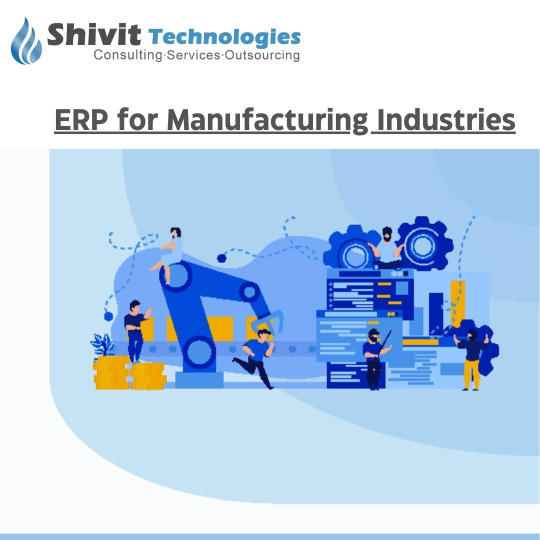
In Mumbai, known as India's financial capital and one of the world's biggest trading centers, various industries flourish. These include Manufacturing sectors like food, chemicals, and paints. To handle their operations smoothly and boost profits, these industries rely on Enterprise Resource Planning (ERP) software.
One popular ERP solution in Mumbai is Shivit ERP. It's designed specifically for process Manufacturing businesses in the region. Shivit ERP helps these businesses manage everything from sales and procurement to production, distribution, finance, quality control, and compliance. It's like an all-in-one tool for optimizing business operations and ensuring customer satisfaction.
Shivit Inventory ERP is an easy-to-use and advanced inventory management system offered in multiple license tiers to fit the financial needs of all companies.
Shivit ERP software allows you to manage inventory easily and leverages advanced technology, such as automation, to boost efficiency. our growing best inventory management software in India
click here: effectively manage your inventory with this advanced and affordable Inventory Management Software
0 notes
Text

Best Manufacturing ERP Software Systems in Malaysia
Boost your manufacturing operations to new heights with Hypernix, the leader in Manufacturing ERP Software Systems in Malaysia!
Are you tired of dealing with inefficiencies, bottlenecks, and delays in your manufacturing processes? It's time to revolutionize your operations with our state-of-the-art ERP software tailored specifically for the manufacturing industry.
#Process Manufacturing ERP Software in Malaysia#Process Manufacturing ERP#ERP software for manufacturing industry#Process Manufacturing For Netsuite#Software For Manufacturing Industry In Malaysia#Best Manufacturing ERP Software Systems
1 note
·
View note
Link
PMTrack ERP is the ERP software services provider for various industries. The ERP software provides a complete Project Management as well as Inventory Management solution for your business
#ERP implementation#ERP software Implementation#ERP system#ERP software for Manufacturing Industry#ERP for Manufacturer#Best ERP software#ERP software#Manufacturing ERP software#ERP software services provider
0 notes
Text
Transform Your Business Dynamics with STERP – Pioneering ERP Solutions for Manufacturing Excellence
Unlock unparalleled efficiency and innovation in your manufacturing processes with STERP (ShantiTechnology), your trusted partner in ERP solutions for manufacturing. Our cutting-edge ERP software for the Manufacturing Industry, ensuring seamless operations, enhanced productivity, and optimal resource utilization. STERP provides ERP for Software Development Company which manages projects, track resources, and enhance collaboration seamlessly. ERP System for Manufacturing Industry covers the entire spectrum – from inventory and financial management to HR processes.
STERP (shantitechnology) brings it all to your fingertips.

#ERP Software for Manufacturing Industry#ERP System for Manufacturing Industry#ERP for Software Development Company#ERP Solutions for Manufacturing#ERPindia#businesssolutions#erpcloud#erp solutions#erp software#business and management#India#Gujarat#Rajkot#Indore#Pune#manufacturer#engineering erp
8 notes
·
View notes
Text
What it is ERP for Manufacturing Industry and why it matters
ERP is defined as a business management system that unifies different processes of an organization under one application. This integration helps in the efficient transfer of information between departments so that businesses can efficiently manage their main processes. In its most basic concept, ERP systems can be defined as integrated software applications that address virtually all corporate functions, such as planning, purchasing, inventory, sales, marketing, financing, and human resources. When implemented, ERP systems assist organizations in the coordination of these activities, leading to the achievement of economies of scale, increased efficiency, and better understanding of complex business processes. The relevance of ERP for Manufacturing Industry in the modern business landscape cannot be overemphasized. Today the market is highly competitive and globalized, which means organizations have to adapt quickly to emerging trends. ERP systems equip the management with the right tools and information to enable them make decisions within the shortest time possible. They foster interdepartmental collaboration, which is vital when it comes to serving customers and running organizations effectively. For example, the sales team needs updated inventory to use when dealing with the customers, and this is provided by an ERP system. Likewise, for the finance department, current and accurate financial information can be obtained which can be useful to monitor expenditures and to forecast future financial results.
#ERP for Manufacturing Company in India#Manufacturing ERP Software#ERP Software for Manufacturing Industry#Manufacturing Software for Small Business#ERP for Manufacturing Industry
0 notes
Text
Why Infor SyteLine ERP Is Ideal for Mid-Market Manufacturers & Service Providers

When electronics and other mid-market manufacturers want their ERP system to enable growth and create a new competitive advantage, they rely upon Infor Infor SyteLine, also known as CloudSuite Industrial (CSI).
When service and rental equipment providers want their ERP system to enable their growth into world-class service organizations and empower field technicians with data at their fingertips, they also rely upon Infor Infor SyteLine CSI.
We’ve all heard the horror stories of failed ERP implementations so, when manufacturers and service providers want SyteLine ERP successfully implemented—and guaranteed—they rely upon Bridging Business Technology Solutions (BBTS).
An ERP Ideal for Manufacturers
Infor SyteLine is the primary ERP we support because it’s ideal for use by discrete and process manufacturers, especially electronics manufacturers. We also guarantee the success of your Infor SyteLine implementation whether you’re commissioning an ERP system for the first time or replacing your current system, so you can cross the risk of a failed implementation off your list of worries.
SyteLine also can be customized to recognize customer-owned inventory and allocate it only to that customer so you don’t have a unique part number for the same part used by multiple customers. You can also reserve stock for specific products of the same customer or reserve any part in your inventory for a specific order until the order is released.
SyteLine delivers the same type of functionality as SAP and Oracle for a fraction of the cost and headache of implementing a tier 1 ERP system.
An ERP Ideal for Service Providers
Infor SyteLine is the primary ERP we support because it’s a perfect fit for service providers, especially those who rent equipment. We also guarantee the success of your Infor SyteLine implementation. So, whether you’re commissioning an ERP system for the first time or replacing your current system, you don’t have to worry about the disruption of a failed implementation.
Among the biggest benefits of SyteLine for service providers is no longer having to enter data multiple times into disparate systems. Working with common data means that everyone works from the same real-time information, which:
Empowers your service technicians to complete more service orders
Enables your employees to spend more time building relationships with customers
Gives your managers the tools to analyze data and find strategic growth opportunities
SyteLine delivers the same type of functionality as SAP and Oracle for a fraction of the cost and none of the headaches associated with implementing a tier 1 ERP system.
Successful Implementations, Guaranteed
The BBTS team has implemented SyteLine successfully over 165 times since 2013 with a proven ERP implementation process that begins with improving inventory control, planning and forecasting, financial close, and other business processes. SyteLine then standardizes these process best practices and ensures they are followed.
BBTS also provides post-implementation SyteLine enhancements, upgrades, business process improvements, and workflow optimization so you get the most out of your SyteLine investment.
Get Started Today
To determine if SyteLine ERP is right for you, we will connect you with one of our implementation experts as part of a process review. A successful implementation begins with understanding your core business processes, then recreating and evolving them in SyteLine.
Together, we can determine how you will benefit from SyteLine and calculate a target return on investment (ROI) to help justify the move. Contact us to learn more about SyteLine and how we are able to guarantee a successful ERP implementation when so many fail. You can also take advantage of the process review offer.
#erp software#infor#syteline#cloudsuite industrial (CSI)#manufacturing#service providers#customer owned inventory
8 notes
·
View notes
Text
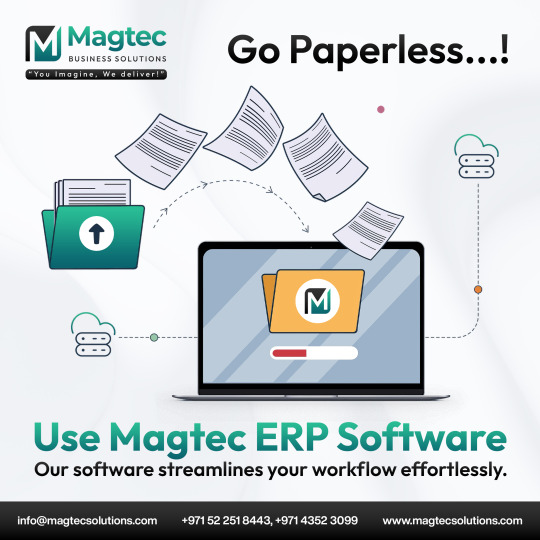
Tired of paper piles? 🚫 Go paperless with Magtec ERP Software! 💻 Streamline your workflow and boost efficiency. It's time to embrace the digital future.
#erp#business#software#management#automation#enterprise#resources#planning#solution#system#cloud#industry#finance#accounting#supplychain#inventory#crm#hr#manufacturing#distribution#retail#healthcare#education#hospitality#smallbusiness#mediumenterprise#largeenterprise#magtecerp#magtec#magtecsolutions
3 notes
·
View notes
Text
5 Key Considerations for Choosing the Right ERP System
Selecting the right Enterprise Resource Planning (ERP) system and choosing the right ERP software Development Company is a crucial decision for any organization. With numerous options available in the market, it's essential to identify the features and functionalities that align with your business needs and objectives.
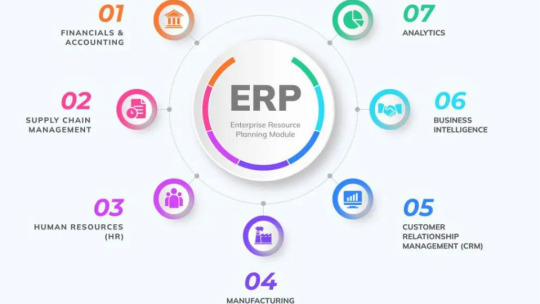
Here are five important factors to consider when evaluating ERP systems:
Platform Scalability and Flexibility
One of the most critical considerations when selecting an ERP system is its scalability and flexibility. As your business grows and evolves, your ERP solution should be able to accommodate increasing data volumes, users, and business processes. Look for a platform that offers scalability without compromising performance, allowing you to expand your operations seamlessly.
A flexible ERP system should also support customization to meet your unique business requirements. Whether you operate in manufacturing, distribution, retail, or services, the ability to tailor the ERP solution to your specific industry and workflows is essential for maximizing efficiency and productivity.
Mobile Support
In today's fast-paced business environment, employees require access to critical information and functionalities while on the go. Therefore, it's essential to choose an ERP system that offers robust support for mobile users. Mobile ERP applications empower employees to perform tasks such as accessing real-time data, approving purchase orders, and managing inventory from their smartphones or tablets.
Look for ERP solutions with responsive design and native mobile apps that provide a seamless user experience across devices. Mobile support enhances employee productivity, facilitates better decision-making, and enables organizations to remain agile and competitive in a mobile-centric world.
Customer Recommendations or Testimonials
Before making a final decision, it's advisable to seek feedback from existing customers or explore testimonials and case studies from organizations that have implemented the ERP system you're considering. Customer recommendations provide valuable insights into the implementation process, system performance, and overall satisfaction with the ERP vendor.
Reach out to industry peers or participate in user forums and discussion groups to gather first-hand experiences and recommendations. Additionally, consider conducting reference calls with potential ERP vendors to gain a deeper understanding of their track record and commitment to customer success.
Ease of Use and Contextualization
User adoption is a critical factor in the success of any ERP implementation. Therefore, it's essential to choose a user-friendly ERP system that minimizes complexity and promotes ease of use across all levels of the organization. Look for intuitive interfaces, streamlined workflows, and contextual help features that guide users through their tasks efficiently.
Furthermore, consider the ERP system's ability to contextualize data and present relevant information based on user roles and responsibilities. Personalized dashboards, role-based access controls, and customizable reporting capabilities empower users to access the information they need to make informed decisions and drive business outcomes.
Long-Term Costs
While upfront costs are an important consideration, it's equally crucial to evaluate the long-term costs associated with implementing and maintaining an ERP system. Beyond the initial license fees, consider factors such as implementation services, training, ongoing support, and upgrades.
Choose an ERP vendor that offers transparent pricing and flexible licensing options tailored to your budget and requirements. Additionally, assess the total cost of ownership (TCO) over the expected lifespan of the ERP system, factoring in expenses such as customization, integration, and system maintenance.
Selecting the right ERP system requires careful consideration of various factors, including platform scalability, mobile support, customer recommendations, ease of use, and long-term costs. By prioritizing these key considerations and conducting thorough due diligence, organizations can choose an ERP solution that aligns with their business goals and sets the foundation for growth and success.
Maximize efficiency with Noetic Labs' ERP solutions tailored to your needs. Whether you're in manufacturing, healthcare, or religious institutions, our ERP system caters to diverse sectors. Experience seamless operations with our manufacturing ERP software, streamline patient care with hospital management software, ensure accuracy in diagnostics with pathology lab software, and manage your congregation effortlessly with church management software. Elevate your organization's performance with Noetic Labs ERP solutions.
#erp software for manufacturing industry in india#erp software development company in india#erp software companies in india#custom erp software development#hospital management software in india.#custom erp software development in india#erp manufacturing software#erp software development company#erp software for manufacturing industry#erp software companies
0 notes
Text
ERP Trends 2024: What Engineering and Manufacturing Industries Need to Know
As we navigate through 2024, the landscape of Enterprise Resource Planning (ERP) systems continues to evolve, presenting both opportunities and challenges for engineering and manufacturing industries. Companies in this sector, especially those in key industrial regions like Maharashtra, Mumbai, Pune, and Gujarat, must stay abreast of the latest ERP trends to maintain competitive advantage and operational efficiency. In this blog, we’ll delve into the significant ERP trends of 2024 and their implications for the engineering and manufacturing sectors.
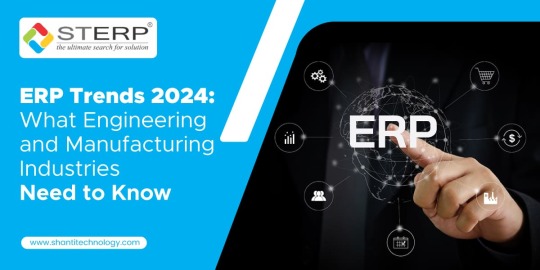
1. Increased Adoption of Cloud-Based ERP Solutions
One of the most significant trends in ERP software for engineering companies in Maharashtra and across India is the shift towards cloud-based solutions. Cloud ERP offers several advantages over traditional on-premise systems, including lower upfront costs, greater scalability, and enhanced accessibility.
Benefits of Cloud-Based ERP:
Cost Efficiency: Eliminates the need for expensive hardware and reduces IT maintenance costs.
Scalability: Easily adjusts to the growing needs of a manufacturing company in Gujarat or an engineering firm in Mumbai.
Accessibility: Provides access to real-time data from anywhere, facilitating better decision-making.
Leading ERP software companies in Pune are increasingly offering cloud-based solutions tailored to the needs of local engineering and manufacturing businesses. These solutions support remote work and ensure business continuity in an increasingly digital world.
2. Integration of AI and Machine Learning
Artificial Intelligence (AI) and Machine Learning (ML) are revolutionizing ERP systems by providing intelligent insights and automating routine tasks. For ERP software for engineering companies in Mumbai, integrating AI can enhance predictive maintenance, optimize supply chain management, and improve production planning.
AI and ML Applications in ERP:
Predictive Analytics: Helps foresee equipment failures and reduce downtime.
Supply Chain Optimization: Enhances demand forecasting and inventory management.
Process Automation: Automates repetitive tasks, freeing up human resources for more strategic roles.
ERP solution providers in Pune are at the forefront of integrating AI and ML into their systems, enabling companies to leverage advanced analytics and improve overall operational efficiency.
3. Emphasis on Cybersecurity
With the increasing digitization of manufacturing processes, cybersecurity has become a critical concern. ERP systems, being the backbone of business operations, are prime targets for cyber-attacks. Engineering and manufacturing companies in regions like Gujarat and Maharashtra need robust cybersecurity measures to protect their sensitive data.
Key Cybersecurity Features:
Data Encryption: Protects data during transmission and storage.
Multi-Factor Authentication: Enhances user authentication processes.
Regular Security Audits: Ensures continuous monitoring and improvement of security protocols.
ERP software for engineering companies in Maharashtra must incorporate these advanced security features to safeguard against data breaches and cyber threats.
4. Enhanced User Experience (UX)
User experience has become a critical factor in ERP adoption and utilization. Modern ERP systems are focusing on intuitive interfaces and user-friendly designs to ensure that all employees, regardless of their technical expertise, can effectively use the system.
UX Improvements:
Intuitive Dashboards: Provide real-time insights and easy navigation.
Mobile Accessibility: Ensures that users can access ERP data on-the-go.
Customization Options: Allow users to tailor the system to their specific needs.
ERP software companies in Pune are prioritizing user experience in their solutions, making it easier for engineering and manufacturing firms to train their staff and increase productivity.
5. Internet of Things (IoT) Integration
The integration of IoT with ERP systems is another trend transforming the manufacturing industry. IoT devices collect vast amounts of data from production lines, equipment, and other operational areas, which can be analyzed by the ERP system to optimize performance.
IoT Benefits in ERP:
Real-Time Monitoring: Provides immediate insights into production processes.
Predictive Maintenance: Schedules maintenance activities based on equipment condition rather than time intervals.
Enhanced Quality Control: Monitors product quality throughout the manufacturing process.
For ERP for manufacturing companies in Gujarat, IoT integration offers a significant advantage by improving efficiency and reducing operational costs.
6. Sustainability and Green Manufacturing
Sustainability is becoming a critical focus for manufacturing companies worldwide. ERP systems are evolving to support green manufacturing practices by tracking and optimizing resource usage, reducing waste, and ensuring compliance with environmental regulations.
Sustainable ERP Features:
Resource Management: Tracks energy and material usage to minimize waste.
Regulatory Compliance: Ensures adherence to environmental laws and standards.
Sustainability Reporting: Provides detailed reports on sustainability metrics.
Engineering and manufacturing companies in regions like Mumbai and Maharashtra can benefit from ERP solutions that incorporate sustainability features, helping them achieve their environmental goals and enhance their corporate reputation.
7. Modular and Flexible ERP Solutions
In response to the diverse needs of engineering and manufacturing firms, ERP solution providers in Pune are developing more modular and flexible ERP systems. These systems allow companies to select and implement only the modules they need, which can be easily scaled and customized as their business grows.
Advantages of Modular ERP:
Cost-Effective: Pay only for the features you need.
Scalability: Easily add new modules as your business requirements evolve.
Customization: Tailor the system to fit specific operational needs.
This trend is particularly beneficial for small to medium-sized enterprises (SMEs) in the engineering and manufacturing sectors, enabling them to adopt ERP systems without the burden of high costs or complexity.
8. Focus on Customer-Centric Manufacturing
ERP systems are increasingly supporting customer-centric manufacturing practices, where production processes are aligned with customer needs and preferences. This approach enhances customer satisfaction and drives business growth.
Customer-Centric ERP Features:
Custom Order Management: Handles unique customer requirements and specifications.
Enhanced CRM Integration: Integrates with customer relationship management (CRM) systems for a holistic view of customer interactions.
Real-Time Order Tracking: Provides customers with real-time updates on their orders.
Manufacturing companies in Gujarat and engineering firms in Maharashtra are leveraging these customer-centric ERP features to improve their service levels and build stronger customer relationships.
9. Advanced Analytics and Business Intelligence (BI)
Advanced analytics and BI are becoming integral components of modern ERP systems. These tools provide deep insights into business operations, helping companies make data-driven decisions and improve performance.
Key BI Features:
Data Visualization: Converts complex data into easy-to-understand charts and graphs.
Dashboards: Offer a real-time overview of key performance indicators (KPIs).
Predictive Analytics: Forecasts future trends based on historical data.
ERP software companies in Pune are incorporating advanced analytics and BI capabilities into their systems, empowering engineering and manufacturing firms to gain a competitive edge through better insights and informed decision-making.
10. Globalization and Localization Support
As engineering and manufacturing companies expand their operations globally, ERP systems must support multiple languages, currencies, and regulatory requirements. Globalization and localization features are essential for companies operating in diverse markets.
Globalization Features:
Multi-Language Support: Accommodates users from different regions.
Multi-Currency Handling: Manages transactions in various currencies.
Compliance with Local Regulations: Ensures adherence to regional laws and standards.
ERP solution providers in Pune and other industrial hubs are enhancing their systems to support global operations, enabling companies to seamlessly manage their international business processes.
Conclusion
The ERP landscape for engineering and manufacturing industries is rapidly evolving, driven by advancements in technology and changing business needs. Companies in Maharashtra, Mumbai, Pune, and Gujarat must stay informed about these trends to leverage the full potential of ERP systems. By adopting cloud-based solutions, integrating AI and IoT, prioritizing cybersecurity, and focusing on sustainability, businesses can achieve greater efficiency, competitiveness, and growth in 2024 and beyond.
For engineering and manufacturing firms looking for the best ERP software for engineering companies in Maharashtra or ERP for manufacturing companies in Gujarat, it is crucial to partner with leading ERP solution providers in Pune who understand the unique challenges and opportunities in this sector. Embracing these trends will not only enhance operational efficiency but also drive innovation and sustainability in the engineering and manufacturing industries.
By staying ahead of these ERP trends, companies can position themselves for success in an increasingly digital and interconnected world. Whether you are an engineering firm in Mumbai or a manufacturing company in Gujarat, the right ERP system can transform your operations and pave the way for a prosperous future.
#ERP software in Vadodara#Manufacturing ERP software in Gujarat#ERP software companies in Vadodara#ERP software providers in Vadodara#ERP for manufacturing company in Gujarat#ERP software#ERP system#cloud ERP#ERP solutions#software development#engineering ERP#management software#engineering services#engineering industry
5 notes
·
View notes